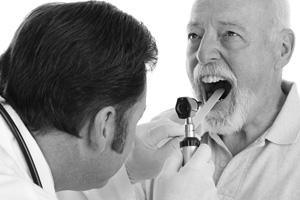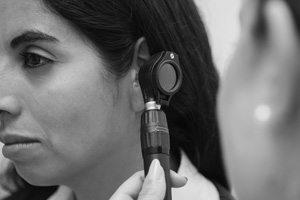View the complete list of conditions
How Can Hearing Loss Surgery Help Me?
Hearing loss is a very frustrating condition because it significantly impacts our ability to communicate, our relationships and sometimes even the progression of our careers. Patients experiencing hearing loss usually try conventional hearing aids to restore lost hearing, but surgery can also significantly improve hearing.
It is important to consult an ear, nose and throat doctor to determine whether ear surgery might benefit you. The type of ear surgery proposed will depend on the specific kind of damage or changes that have occurred in your ear. In some cases, surgery can eliminate the need for conventional hearing aids.
Conductive Hearing Loss Treatment and Surgery
The condition known as conductive hearing loss occurs when the outer or middle ear is obstructed or damaged. Either situation will prevent sound from reaching the inner ear. Damage due to repetitive ear infections can be permanent. In cases like this, several surgical procedures may be valuable in restoring some level of lost hearing:
- Pressure Equalization (PE) Tubes - PE tubes can be placed in the eardrum to facilitate air passage into the middle ear. PE tubes sometimes fall out on their own, while others must be surgically removed. PE tubes can alleviate the impact of infections and solve hearing problems caused by malformed eardrums, Down syndrome or a cleft palate.
- Tympanoplasty - Tympanoplasty is surgery to repair a hole in the eardrum. During the procedure, a skin graft is positioned over the hole to close the opening. The graft remains in place for a permanent restoration solution.
- Stapedectomy - A stapedectomy surgery may be indicated for patients with hearing loss caused by otosclerosis, which is hardening of the middle ear's bone tissue. When the stapes bone of the middle ear becomes rigid and fixed in place, it loses the ability to vibrate, which is necessary to promulgate sound through the ear.
People suffering from otosclerosis also may notice dizziness or tinnitus as a symptom. Stapedectomy surgery is the most effective means of treating hearing loss caused by otosclerosis (and is sometimes called otosclerosis surgery). In this procedure, a surgeon implants a tiny prosthetic device that circumvents the hardened bone tissue in the middle ear so that sound can be delivered again.
Sensorineural Hearing Loss Treatment
A patient diagnosed with sensorineural hearing loss has probably experienced some damage to the tiny hair cells of the inner ear or the nerve pathways connecting the brain and the inner ear. This hearing loss is often caused by exposure to medications, head or acoustic trauma, disease, extremely loud noise, tumors or old age.
Sensorineural hearing loss occurs because hair cells of the cochlea have been damaged. As a result, they cannot transmit sound waves received at the outer ear into normalized electrical impulses, which are delivered to the brain via the auditory nerve and interpreted as sound.
Treatment options for sensorineural hearing loss includes cochlear implants. These devices can be surgically positioned in the inner ear to achieve partial restoration of hearing by bypassing the damaged cells to provide more direct stimulation of the auditory nerve. However, doctors do not usually recommend cochlear implants unless hearing aids have already been tried and found to be ineffective for a given patient. Here is how cochlear implants work to alleviate hearing loss:
- In the first step, an otolaryngologist specializing in neurotology places a tiny electronic device beneath the skin in the back of the ear. This device will be connected to electrodes that are placed in the cochlea.
- A second unit, which looks like a traditional hearing aid, is then inserted behind the ear. This device has a microphone capable of receiving sound, along with a speech processor capable of translating that sound into electric signals.
- The signals are then transmitted through the skin to an internal electronic stimulator. That device sends the signal to electrodes implanted in the cochlea, which permits relatively normal hearing for the patient.
Surgery for Conductive Hearing Loss and Sensorineural Hearing Loss
For either of these conditions, an appropriate surgical option might be bone-anchored hearing aids. These hearing aids can bypass any damage to the middle ear and transmit sound directly to whichever ear is better through the tiny bones in your head.
By attaching an external hearing aid to the bone behind your ear, an otolaryngologist can help restore your hearing because vibrations of sound through the bone can be sensed for as long as you are wearing the device.
The Latest Treatment for Hearing Loss
Contact our office for an appointment to discuss your hearing loss and determine whether you are a candidate for hearing loss surgery. Dr. Eric Cohen and his knowledgeable staff are up to date on the latest hearing loss treatments, surgery options and techniques and can explain all available hearing loss treatment options. When looking for an ear surgeon in NYC, it is important to select a board-certified otolaryngologist to receive the best hearing loss care and treatment.
Conditions
Ears
Nose
- Ballon Sinusplasty Surgery
- Concha
- Deviated Septum Relief In NYC
- Deviated Septums
- Fixing a Deviated Septum
- Identifying A Deviated Septum
- How Do I Know if My Nose is Broken?
- Nasal Polyps
- Nasal Polyp Surgery
- Nasal Septums
- NYC Nasal Polyp Reduction
- Septoplasty And Turbinate Surgery
- Treating a Deviated Septum
- Treating Nasal Polyps
- Turbinate Reduction
Throat
- Dysphagia
- Leukoplakia Treatments
- Reflux Laryngitis
- Swallowing Disorders
- Treating Anosmia
- Vocal Disorders
Allergies & Asthma
- Dealing With Allergic Rhinitis
- Managing Allergies and Asthma
- How to Allergy-Proof Your Home from Indoor Allergens
Sinus
- Chronic Sinusitis Treatment
- Endoscopic Sinus Surgeries
- Sinus Headache Cure
- Sinus Infection Treatment
- Sinusitis Surgery
- Treating Sinus Infections
Sleep & Snoring
- Diagnosing Sleep Disorders
- Having Trouble Sleeping
- Home Sleep Studies
- Pillar Implants
- Pillar Treatment for Snoring
- Sleep Apnea Conditions
- Sleep Apnea Specialists
- Sleepless in NYC
- Sleep Study Diagnosis
- Can Snoring Cause Health Issues?
- Treating Sleep Apnea
- Treating Snoring
- What is a CPAP Device?





